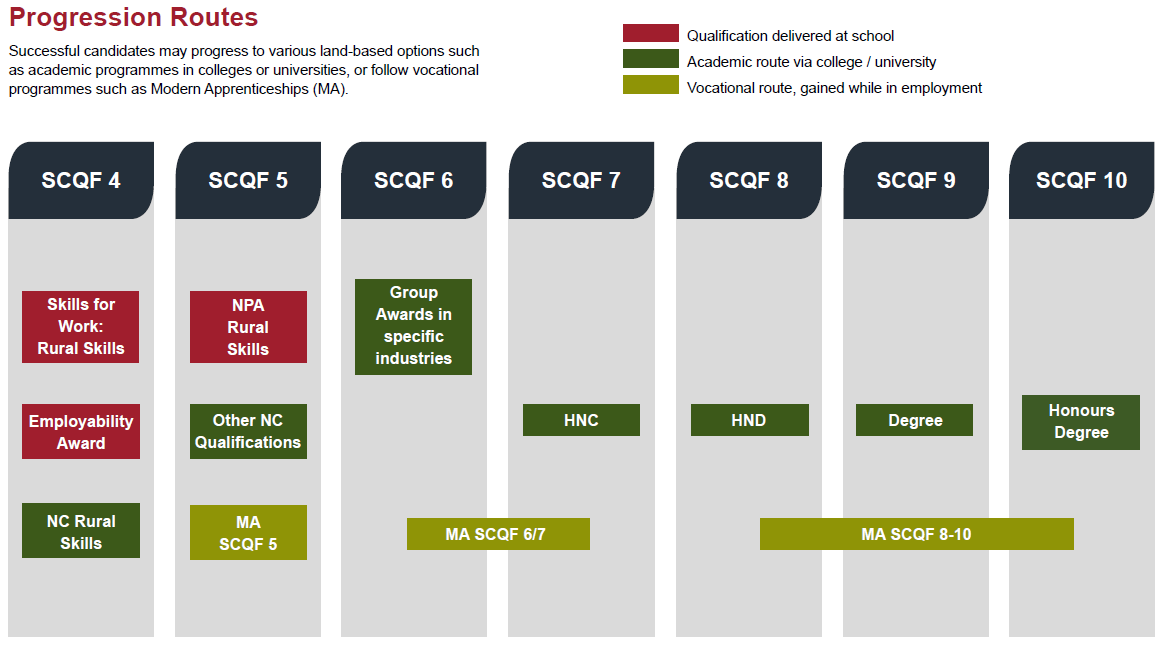- Skills for Work: Rural Skills (SCQF Level 4)
-
This introductory qualification focuses on the development of general employability skills through a variety of practical experiences in rural skills. It begins with three mandatory units, exploring the diverse employment prospects that exist in land-based industries, before developing basic skills through either a plant or animal-focused route.
Breadalbane Academy, Aberfeldy:
Breadalbane’s Community Garden Project has allowed the school to show pupils some of the many jobs available within rural industries. Through the Skills for Work: Rural Skills programme and visits to local industry employers, pupils are widening their practical, social and employability skills. Breadalbane has also partnered with nurture groups from local primary schools to encourage the academic and social development of younger pupils in an outdoor setting.
The project has featured on the BBC’s Beechgrove Garden TV programme and won numerous awards, including Lantra Scotland’s Land-based and Aquaculture Learner of the Year School Award in 2012, 2015 and 2017. Breadalbane is currently looking to widen the rural industry experience available to pupils by connecting with gamekeepers and ground maintenance staff from local estates.
- Employability Award (SCQF Level 4)
-
This introduction to the world of work focuses on general employability skills, such as looking at existing skills and experience, building on them and applying them to the workplace. It consists of one optional and two mandatory units. Flexibilty about how it is delivered and assessed means that it can be tailored to individual student needs.
Dumfries & Galloway Employability Award:
Since 2016, Dumfries & Galloway Council DYW team has worked with local schools and farmers to offer a customised land-based employability award. Pupils spend one day a week over an academic year on a local farm, gaining qualifications in livestock production and animal care, delivered and assessed by SRUC, as well as general employability and core skills units.
The team hope to extend the range of work placements to include other land-based sectors, such as forestry and horticulture, and develop a clear pathway for young people interested in a career in land-based industries.
Louise Main, student at Castle Douglas High School, took part in the D&G Employability Award the year after she did her exams. She felt she needed guidance on how to take up a career in farming, so being assessed in a controlled working environment in the dairy sector gave her more confidence and she got a place on the HNC Agriculture course at SRUC.
- NPA Rural Skills (SCQF Level 5)
-
The NPA qualification helps students gain skills and knowledge relating to an area of the land-based sector and to learn more about how a rural business operates.
Study routes are available in: agriculture, animal care, equine studies, estate skills, fisheries management, forestry, gamekeeping and horticulture.
Wallace Hall Academy, Thornhill:
Thanks to its rural location, Wallace Hall Academy has been able to develop a curriculum promoting local employment opportunities in land-based industries while developing pupils’ employability, inter-personal and entrepreneurial skills. Connections with Queensberry Estate and 17 local agricultural businesses allow the young people to widen their skills through a range of vocational courses, including NPA Rural Skills in Forestry and Agriculture. This gives them a broad experience of beef, diary, pork and egg production on various farms.
In addition, career mentoring and work experience programmes with local land-based companies provide opportunities to build working relationships with potential employers. The pupils have also developed a social enterprise, WHApples Community Orchard. Its fruits and products are sold by the pupils and an accessible public space strengthens links with the local community.
- Non-SQA Accredited Courses
-
Alternatives to SQA qualifications are offered by The John Muir Trust (The John Muir Award), the Royal Horticultural Society (RHS) Awards and Royal Caledonian Horticultural Society (The Caley Award):
The John Muir Award is an environmental award scheme which was set up to promote educational, social and personal development through engagement with wild areas and involvement in conservation. It is free to use, with all information and booklets being available on The John Muir website. It can be used to deliver Curriculum for Excellence outcomes through outdoor learning approaches.
The RHS offers qualifications at various levels, however the Level 1 Awards are aimed at those with an interest in plants and gardening in full-time education, or assisted learning, aged 14 or over. There are two Level 1 awards, both providing an understanding of essential practical skills and assessment is through practical activities.
The Caley Grow and Learn is a two-level horticultural award scheme that recognises individual progress and achievement through experiential learning and personal development. It offers the learner a structured framework but is also flexible enough to meet the needs of individual students.
